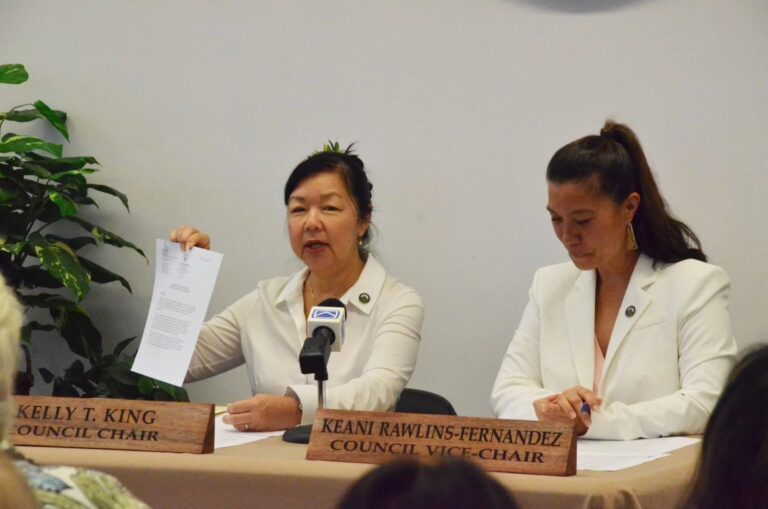Hawaii Public Radio, October 9, 2019
Click here to listen to radio broadcast of this story
By ASHLEY MIZUO
The Maui County Council last month voted to settle the Clean Water Act lawsuit scheduled for oral arguments before the United States Supreme Court in November, but a dispute over the council’s authority may land the case before the high court anyway.
Maui County was sued in 2012 by a group of local environmental groups, which alleged a Lahaina waste water treatment facility violated the federal Clean Water Act. The case has made its way to the Supreme Court, where it is scheduled to be heard in November, with national and local impacts at stake.
On Tuesday, Council Chair Kelly King asked the county’s Corporation Counsel to submit a resolution to hire special counsel who would represent the County Council in settling the case.
Corporation Counsel’s office, which represents both Maui Mayor Michael Victorino’s administration and the council, submitted the proposal and it will be discussed in the council’s Governance Ethics and Transparency Committee on Tuesday.
King explained that Committee Chair Michael Molina decided to expedite the process by planning to send the proposal to the full council after discussion in committee Tuesday without a vote.
“If he didn’t do it that way and he put it in his committee for a vote then we’d have to wait for a committee report and it wouldn’t get heard until Nov. 8,” King said. That would be two days after the Supreme Court is scheduled to hear oral arguments in the case.
Instead, the council’s proposal calling for a special counsel will be heard at the full panel’s meeting on Oct. 18.
“If that resolution is adopted by two-thirds vote, the council would be able to hire its own private attorney and go to court and ask for a ruling on whether the council is correct in viewing the settlement in its own legislative authority,” said David Raatz, Office of Council Services supervising legislative attorney.
The Office of Council Services attorney can only provide the council with legal advice but only the Corporation Counsel can represent the council.
The proposal would allocate up to $100,000 for the special counsel.
“One way or another we have to get clarity on this issue because right now we have a crisis with the [County] Charter,” King said. “We don’t have a clear agreement on what the Charter says and who has the authority. I think this can only be resolved in court at this point.”
Mayor Victorino’s office declined Wednesday to comment on the council chair’s latest moves in the case.
On Sept. 20, after hours of public testimony and deliberation on whether to settle the County of Maui v. Hawaii Wildlife Fund case, and just before the Maui County Council voted on settling the case, the county’s Corporation Counsel representative opined that he did not think the council was authorized to settle the case after all.
The Maui council voted 5-4 to settle the case despite the issues raised by the Corporation Counsel’s office.
On Sept. 25, Council Chair King wrote a memo to the Corporation Counsel, urging the office to settle the case. However, the office declined the request last week, expressing the view that the council did not have the exclusive authority to settle the case.
The Corporation Counsel’s memo listed eight terms of a settlement offer. The office determined that six out of the eight were exclusively under the mayor’s authority, one term was exclusively under the council’s authority and one required both parties to authorize.
Mahesh Cleveland, an associate attorney at Earthjustice, one of the groups suing Maui County explained that the council-approved settlement can be executed even after the oral arguments are heard.
“Technically, an appeal up to the Supreme Court can be withdrawn up until the court publishes the opinion, so there is the possibility that the case could be argued and yet still settled after arguments,” he said. “Because the Supreme Court has the discretion to hear appeals, they also have discretion to put the brakes on if they choose to.”
King is also pursuing a postponement of the case by appealing to the Supreme Court’s clerk.
“I’ve sent a letter to the clerk of supreme court. . . describing where we’re at as far as this crisis of the charter and asking them to either dismiss the case or at the very least postpone it until we can resolve our charter crisis,” King said.
Under the Supreme Court rules, a case can be dismissed at any stage of the proceedings so long as all parties on record with the court clerk are in agreement.
Cleveland explained that it’s up to the county administration and the council to decide what happens next.
“At this point the tension is between the branches of government within the county.”
Original article URL:
https://www.hawaiipublicradio.org/post/maui-county-could-be-headed-supreme-court-water-case-despite-council-settlement-vote#stream/0

